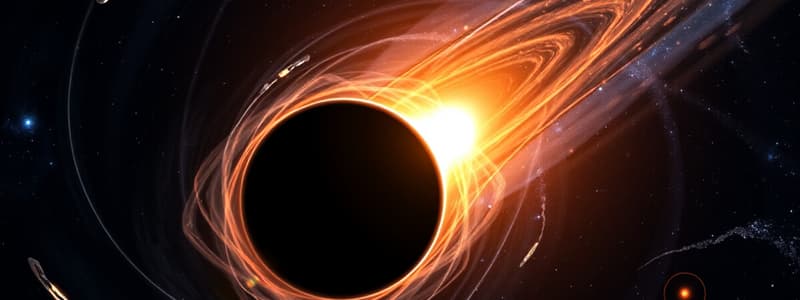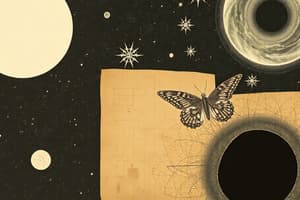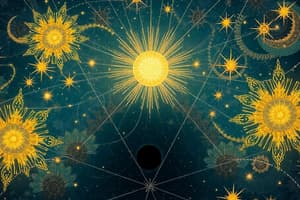Podcast
Questions and Answers
What does the Schwarzschild radius of a black hole depend on?
What does the Schwarzschild radius of a black hole depend on?
Only the mass of the black hole
What would happen if a 1.5-solar-mass neutron star appeared in your hometown?
What would happen if a 1.5-solar-mass neutron star appeared in your hometown?
- Earth would explode
- The neutron star would disappear
- Nothing would happen
- The entire mass of Earth would become a thin layer over the neutron star (correct)
How do we know that pulsars are neutron stars?
How do we know that pulsars are neutron stars?
No massive object, other than a neutron star, could spin as fast as we observe pulsars spin.
From an observational standpoint, what is a pulsar?
From an observational standpoint, what is a pulsar?
Sort the statements about black holes based on their accuracy. Which statements are true?
Sort the statements about black holes based on their accuracy. Which statements are true?
Why is the statement 'a 3-solar-mass black hole may be hidden between Jupiter and Saturn' not true?
Why is the statement 'a 3-solar-mass black hole may be hidden between Jupiter and Saturn' not true?
Why is the statement 'the singularity of a black hole has infinite density' classified as unknown?
Why is the statement 'the singularity of a black hole has infinite density' classified as unknown?
Why is the statement 'black holes make up 1% of the mass of the Milky Way Galaxy' classified as unknown?
Why is the statement 'black holes make up 1% of the mass of the Milky Way Galaxy' classified as unknown?
Which statements about gravitational waves are true?
Which statements about gravitational waves are true?
What is the Schwarzschild radius of a 2×10^8 solar-mass black hole in the center of a quasar?
What is the Schwarzschild radius of a 2×10^8 solar-mass black hole in the center of a quasar?
What is the Schwarzschild radius of a 5 solar-mass black hole that formed in a supernova?
What is the Schwarzschild radius of a 5 solar-mass black hole that formed in a supernova?
What is the Schwarzschild radius of a mini-black hole with the mass of the Moon?
What is the Schwarzschild radius of a mini-black hole with the mass of the Moon?
Estimate the Schwarzschild radius for an object weighing 50 kg.
Estimate the Schwarzschild radius for an object weighing 50 kg.
What happens to time on the other rocket as it falls toward the event horizon of the black hole?
What happens to time on the other rocket as it falls toward the event horizon of the black hole?
What would an observer in the orbiting rocket see as the falling rocket approaches the event horizon?
What would an observer in the orbiting rocket see as the falling rocket approaches the event horizon?
Why will the in-falling rocket eventually disappear from view?
Why will the in-falling rocket eventually disappear from view?
If you were inside the rocket that falls toward the event horizon, you would notice your own clock to be running __________.
If you were inside the rocket that falls toward the event horizon, you would notice your own clock to be running __________.
If you were inside the rocket that falls toward the event horizon, from your own viewpoint you would __________.
If you were inside the rocket that falls toward the event horizon, from your own viewpoint you would __________.
What is the Schwarzschild radius of a 100 million-solar-mass black hole?
What is the Schwarzschild radius of a 100 million-solar-mass black hole?
How does the gravity of an object affect light?
How does the gravity of an object affect light?
Rank these locations in the Milky Way Galaxy based on their distance from the center, from farthest to closest:
Rank these locations in the Milky Way Galaxy based on their distance from the center, from farthest to closest:
Flashcards are hidden until you start studying
Study Notes
Black Holes
- The Schwarzschild radius is determined solely by the mass of a black hole.
- A 1.5-solar-mass neutron star would compress the entire mass of Earth into a thin layer about 1 cm thick on its surface.
- A black hole can contain a stellar mass in a space less than a few kilometers across, and it can form during a supernova explosion.
- Claims about black holes include:
- True: black holes can merge and emit gravitational waves; material from a binary companion can create an X-ray-emitting accretion disk; black holes are smaller than their Schwarzschild radii.
- Not true: black holes will not suck in any binary companion star, and the assertion about squashing at the event horizon is incorrect.
- Unknown: the exact percentage of the Milky Way’s mass that is made up of black holes remains unclear due to detection limitations.
Pulsars
- Pulsars are observed as regular flashes of light several times per second, indicating high rotation speeds.
- The rapid rotation of pulsars is characteristic of neutron stars, confirming their identity.
Gravitational Waves
- The LIGO observatory announced the first direct detection of gravitational waves in 2016.
- Merging black holes produce gravitational waves, as predicted by Einstein’s general relativity.
- Two orbiting neutron stars or black holes spiral towards each other due to energy loss from gravitational waves.
Schwarzschild Radius Calculations
- A black hole with 2×10^8 solar masses has a Schwarzschild radius of 6.0×10^8 km.
- A 5-solar-mass black hole has a Schwarzschild radius of 15 km.
- A mini-black hole with the mass of the Moon has a Schwarzschild radius of 0.11 mm.
- A theoretical mini-black hole from a 50 kg mass would have a Schwarzschild radius of 7×10^−29 km.
- A 100 million solar-mass black hole would have a Schwarzschild radius of 300 million km.
Observational Effects Near Black Holes
- From the viewpoint of an observer in an orbiting rocket, time appears to run slower for an in-falling rocket as it nears the black hole.
- Observers will never see the falling rocket actually cross the event horizon, as it appears to slow down and fade from view due to extreme redshift.
- Individuals inside the falling rocket would experience time normally and would cross the event horizon without impediments.
Light and Gravity
- Light emitted from compact massive objects, like neutron stars, experiences redshift due to intense gravitational forces.
Distances within the Milky Way
- Locations in the Milky Way can be ranked from farthest to closest to the center:
- Farthest: globular cluster in the outskirts of the halo
- Cloud of gas and dust in the outskirts of the disk
- Our solar system
- Edge of the central bulge
Studying That Suits You
Use AI to generate personalized quizzes and flashcards to suit your learning preferences.




